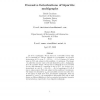Free Online Productivity Tools
i2Speak
i2Symbol
i2OCR
iTex2Img
iWeb2Print
iWeb2Shot
i2Type
iPdf2Split
iPdf2Merge
i2Bopomofo
i2Arabic
i2Style
i2Image
i2PDF
iLatex2Rtf
Sci2ools
DAM
2010
2010
Excessive factorizations of bipartite multigraphs
Let G be a multigraph. We say that G is 1-extendable if every edge of G is contained in a 1-factor. Suppose G is 1-extendable. An excessive factorization of G is a set F = {F1, F2, . . . , Fr} of 1-factors of G whose union is E(G) and, subject to this condition, r is minimum. The integer r is called the excessive index of G and denoted by e(G). Analogously, let m be a positive integer. We say that a multigraph G is [m]-coverable if every edge belongs to a matching of size m of G. An excessive [m]factorization is a set M = {M1, M2, . . . , Mk} of matchings of G, all of size m, whose union is E(G) and, subject to this condition, k is minimum. The integer k is denoted by [m](G) and called excessive [m]-index of G. In this paper we shall prove that, for bipartite multigraphs, both the parameter e and [m] are computable in polynomial time, and we shall obtain an efficient algorithm to find an excessive factorization (excessive [m]-factorization, respectively) of any bipartite multigraph. 1...
| Added | 10 Dec 2010 |
| Updated | 10 Dec 2010 |
| Type | Journal |
| Year | 2010 |
| Where | DAM |
| Authors | David Cariolaro, Romeo Rizzi |
Comments (0)

